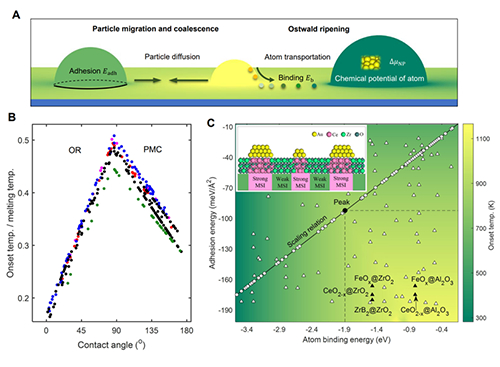With the support of National Natural Science Foundation of China (Nos: 91945302, 21903077), the research team of Professor Li Weixue from University of Science and Technology of China, proposed a general theory using scaling relation to enable the high-throughput screening of supports boosting the stability of nanocatalysts against sintering. The results were published in the article entitled "Sabatier principle of metal-support interaction for design of ultrastable metal nanocatalysts" in Science on November 5, 2021. The article's link is http://www.science.org/doi/10.1126/science.abi9828.
The design and development of catalysts with high activity, high selectivity, and high stability are of great significance for improving the efficiency of catalytic reactions, saving energy and reducing consumption. Among others, nanocatalysts have received extensive attention for a long time and made great progress due to their high atom utilization and unique quantum effects. However, stability of nanocatalysts is becoming one of the main bottlenecks for industrialization to achieve high-efficiency chemical production. So far, fundamental understanding and general theory on the stability of nanocatalysts against sintering are not available, thereby necessitating expensive and time-consuming trial-and-error experimentations.
Facing this difficult issue involving complex physical and chemical processes, Li et al reported a Sabatier principle of metal-support interaction (MSI) for the stability of supported metal nanoparticles against sintering based on the linear scaling relationship between the particle adhesion energy and atom binding energy with supports. Sintering kinetic simulations of 323 metal–support pairs using 1252 energetics data were conducted, and a universal volcanic dependence of the sintering kinetics on MSI was revealed. It was found that the optimal MSI corresponding to the highest stability on homogeneous supports should be neither too strong nor too weak. Too strong of a MSI triggered rapid Ostwald ripening, whereas too weak of a MSI stimulated facile particle migration and coalescence, both of which severely worsened the stability. For supports with the optimal MSI to nanoparticles, the sintering onset temperature is about half of the melting temperature of the bulk metal for typical nanoparticles (~3 nm), substantiated by the long-reported empirical Tammann temperature. The revealed Sabatier principle enables the high-throughput screening of heteroenergetic supports to break the scaling relationship and boost the sintering resistance of the supported NPs far beyond the Tammann temperature. The theory substantiated by molecular dynamics simulation based on the first-principles neural network potential and available experiments provides a promising way to design ultrastable nanocatalysts.

Fig. 1. Sabatier principle of sintering-resistance stability of metal nanocatalyst and the design and high-throughput screening of dual-functional support.

Add: 83 Shuangqing Rd., Haidian District, Beijing, China
Postcode: 100085
Tel: 86-10-62327001
Fax: 86-10-62327004
E-mail: bic@donnasnhdiary.org
京ICP备05002826号 文保网安备1101080035号 Copyright 2017 NSFC, All Right Reserved